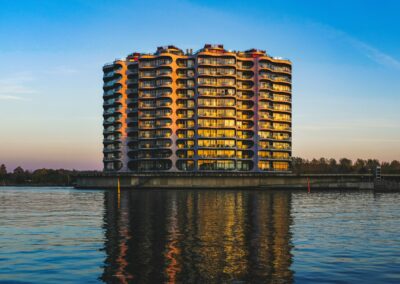Implementing Smart Water Management Systems for Resource Conservation and Sustainability
Optimizing Water Usage with Advanced Technology
The implementation of smart water management systems is pivotal for the conservation of resources and ensuring sustainability in smart cities, particularly in regions like Saudi Arabia and the UAE. In cities such as Riyadh and Dubai, where water scarcity is a pressing issue, the use of advanced technologies like Artificial Intelligence (AI), Internet of Things (IoT), and data analytics is revolutionizing how water resources are managed. These systems enable real-time monitoring and control of water distribution networks, detecting leaks, optimizing usage, and reducing waste.
AI-powered analytics provide valuable insights into water consumption patterns, helping to identify inefficiencies and areas for improvement. In Riyadh, for example, AI is used to forecast water demand based on historical data and weather patterns, allowing for better planning and allocation of water resources. Similarly, in Dubai, smart water meters equipped with IoT sensors monitor usage in real-time, providing residents and businesses with detailed information about their water consumption. This transparency encourages more responsible water use and helps to prevent waste.
Furthermore, the integration of blockchain technology in water management systems enhances transparency and accountability. Blockchain ensures that all transactions and data related to water usage are securely recorded and cannot be altered, providing a reliable audit trail. This is particularly important for managing shared water resources and ensuring that all stakeholders are held accountable for their usage. By leveraging these advanced technologies, smart cities can significantly improve their water management practices, contributing to long-term sustainability and resource conservation.
Enhancing Efficiency and Reducing Costs
Smart water management systems also offer significant economic benefits by enhancing efficiency and reducing costs. For businesses and municipalities in Saudi Arabia and the UAE, the ability to monitor and control water usage in real-time translates into substantial cost savings. By detecting leaks and addressing them promptly, these systems prevent water loss and reduce the need for expensive repairs. Additionally, optimized water distribution networks require less energy for pumping and treatment, further lowering operational costs.
Effective communication and leadership skills are crucial for the successful implementation of smart water management systems. Executive coaching services can help leaders understand the technology and its benefits, enabling them to drive change and innovation within their organizations. By fostering a culture of sustainability and innovation, businesses can enhance their reputation and competitiveness in the market.
Management consulting firms play a vital role in helping companies and municipalities navigate the complexities of adopting smart water management systems. These consultants provide expertise in project management, change management, and technology integration, ensuring a smooth transition and maximizing the benefits of the new systems. In the long run, businesses and municipalities that invest in smart water management systems will be better positioned to meet regulatory requirements, reduce operational costs, and contribute to broader sustainability goals.
Supporting Sustainable Urban Development
The implementation of smart water management systems is essential for supporting sustainable urban development. In rapidly growing cities like Riyadh and Dubai, the demand for water is continuously increasing, putting pressure on existing resources and infrastructure. By optimizing water management practices, smart cities can ensure that they meet the needs of their growing populations without depleting natural resources or harming the environment.
The use of generative AI and advanced data analytics can further enhance urban planning and development. These technologies allow city planners to create detailed simulations and models, predicting the impact of new developments on water resources and infrastructure. This proactive approach ensures that new projects are designed with sustainability in mind, minimizing their environmental footprint and contributing to the overall resilience of the city.
Moreover, smart water management systems align with the broader vision of sustainability outlined in initiatives like Saudi Vision 2030 and the UAE’s National Agenda. These strategic plans emphasize the importance of environmental stewardship and the role of technology in achieving sustainable development goals. By investing in smart water management systems, Saudi Arabia and the UAE are demonstrating their commitment to creating sustainable, livable cities for future generations.
#SmartCities #WaterManagement #Sustainability #SmartWaterManagement #AI #Blockchain #Dubai #Riyadh #UAE #SaudiArabia
























